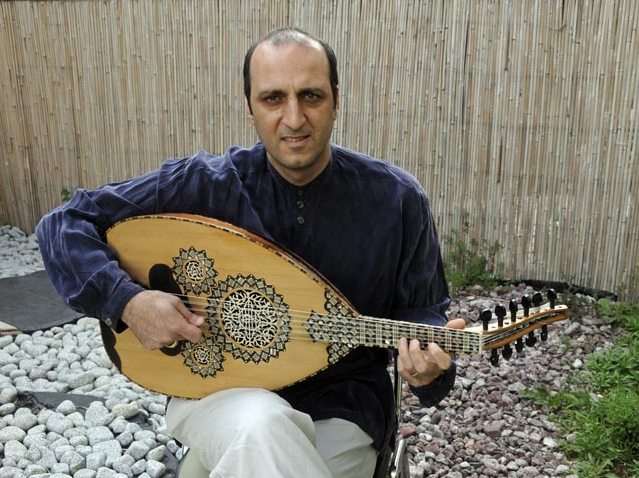Firkat Al Nur plays unique classical Arabic music
-
-
12/22/2013
GovXShortDescription
Dr. Yehuda Kamari, a specialist in the prevention of cardiovascular disease, is also endowed with a love of Arabic music that led him to establish an orchestra, Firkat Al Nur, with whom he hopes to appear in Egypt and Iraq.
-
-

 Dr. Yehuda Kamari playing the oud
Copyright: Debbie Hill
Dr. Yehuda Kamari playing the oud
Copyright: Debbie Hill
|
GovXContentSection
When Dr. Yehuda Kamari plays the oud with the orchestra he formed, Firkat Al Nur, it seems that Arabic music has always flowed in his blood, that he lives and breathes this music as much as his cultural heroes in this genre - among the most well known artists and composers in Iraq and Egypt.
The son of a Persian family, he grew up playing Neil Young and Joni Mitchell on his guitar. However, as a medical student, he began playing the oud and was exposed to classical Arab music. He was spellbound. Salim Al Nur, an Iraqi Jew and one of the greatest composers in Iraq in the 1940s, was Dr. Kamari's teacher and imbued him with a great love for Iraqi music, and here begins his story.
Dr. Kamari is a busy doctor - a cardiovascular specialist who also manages a research laboratory at the Sheba Medical Center. His teacher, Salim Al Nur, was a gifted composer Before immigrating to Israel from Iraq, who wrote his first song at the age of 17 for Salima Murad - one of the great singers of Arabic music.
Kamari would sit for hours with Al Nur and listen to Abdel Wahab, Umm Kulthum, Fairuz, learning the language and playing Iraqi and Egyptian classical music. During these sessions, Kamari was also exposed to works written Al Nur himself, who specialized in the genre called Sama'i, pieces composed of five verses of ten beats each. According to Dr. Kamari, Al Nur is a musical genius.
"His compositions are astonishingly beautiful, sophisticated and innovative," says Dr. Kamari, "and since he has not reached the public consciousness, I felt a duty to take this fantastic musical material and do something with it. I realized that this was world-class music that would be lost if I didn't record the music. For me, it's like finding unknown works of Mozart."
When Dr. Kamari realized that a large part of the works of this "Iraqi Mozart" had not been written down and documented, he decided to devote himself to this unique conservation project. Together with Jewish and Arab musicians from Israel, he formed an ensemble which began to piece together and document music never before recorded. In 2005 new ensemble performed a concert in homage to Salim Al Nur and in 2009 issued a disc entitled "Al Nur" presenting the lost works of the composer.
-
-
-
-
-
-
GovXParagraph1
The project continues today through the Firkat Al Nur
orchestra, whose classical Arabic repertoire also brings innovation and a
unique twist to this genre.
The vision of the orchestra is to
preserve the musical legacy of Jewish musicians from Arab countries who,
having left their countries of origin, were largely forgotten and are
not even cited by name when their music is taught in academic
institutions. Firkat Al Nur was established to prove that the songs they
composed remain alive.
"Arabic music today is experiencing a
renaissance. There is much more openness and a growing interest, which
justifies the existence of Firkat Al Nur," said Dr. Kamari. "It is the
only orchestra that performs playing classical Oriental music alongside
new materials."
The atmosphere on stage makes listeners feel like
they are in the Egyptian Opera House in Cairo. "On stage I feel kind of
magic, we are making history," said Dr. Kamari. "We want to continue to
preserve this amazing music here in Israel, and also to appear before
other Arab audiences, because we are part of the Middle Eastern Arab
environment, and I feel that this is the natural stage for our music."
-
-
-
-
GovXParagraph3
Through
Facebook, Dr. Kamari has become exposed to fans all over the world, and
is very flattered by warm responses he receives from the Arab world.
"Thanks to the exposure through endless social networks, I have many
friends in the Arab world and I hope to increase this exposure." He also
receives a lot of positive feedback from Jewish and Arab musicians.
Firkat
Al Nur consists of 13 musicians who speak Iraqi, Tunisian, Moroccan and
Egyptian Arabic. They are among the leading musicians in the genre of
classical Arabic and Oriental music in Israel today. The audience that
comes to listen to their music is composed of both Arabs and Jews,
religious and secular.
"It is important for us to show the Arab
world that not only Western culture is alive and kicking in Israel.
Music connects people, it is a bridge of understanding and dialogue. We
represent all those who dream and breathe Arab culture and classical
Arabic music."
-
-
-
-
-
-
-
-
-